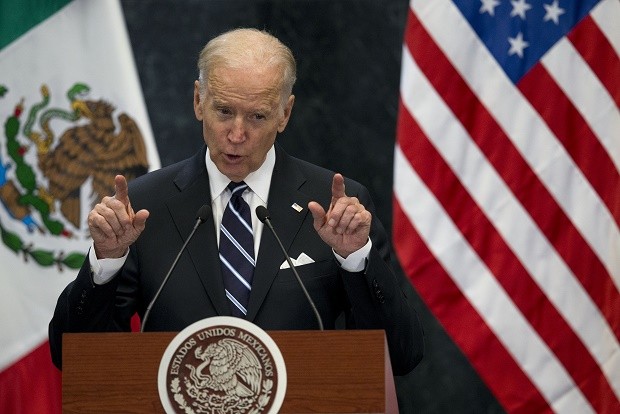Biden: Campaign rhetoric on Mexico ‘dangerous, damaging’

U.S. Vice President Joe Biden speaks during a joint message to the press with Mexican President Enrique Pena Nieto, in Mexico City, Thursday, Feb. 25, 2016. Biden led a high-level U.S. delegation for annual talks on boosting economic and commercial ties with Mexico, one of the United States’ top trading partners. AP
MEXICO CITY — Vice President Joe Biden said Thursday that some US campaign rhetoric about Mexico and immigrants has been “dangerous, damaging and incredibly ill-advised” and is out of step with most Americans’ attitudes.
Speaking in Mexico City at Cabinet-level talks on boosting economic and commercial ties with one of the United States’ top trading partners, Biden reassured Mexican officials that such talk does not reflect the countries’ bilateral relations.
“The main message I wanted to say to you is that I understand that you can’t poison the well and at the same time work out a real estate agreement to buy the well,” he said.
Without naming names Biden was generally critical of Republican candidates, several of whom have proposed measures from walling the entire US-Mexico border to deporting all 11 million people estimated to be living in the United States illegally. GOP front-runner Donald Trump said last year that Mexico was sending crime, drugs and “rapists” north of the border.
“Some of the rhetoric coming from some of the presidential candidates on the other team are I think dangerous, damaging and incredibly ill-advised,” Biden said. “But here’s what I’m here to tell you: They do not, they do not, they do not represent the view of the vast majority of the American people.”
READ: Immigration at center of Pope’s visit to Mexico-US border
After meeting with Biden later in the day, Mexican President Enrique Pena Nieto referred to the immigration talk.
“There are those who have the vision to eventually close themselves off, including, I daresay Mr. Vice President, to build walls,” Pena Nieto said. “But that is only isolating. This is to be alone. It may look in one way like you’re closing passage to a place, but seen another way it is isolation.”
Biden addressed the issue again, saying, “I feel almost obliged to apologize for some of what my political colleagues have said about Mexico, about the Mexican people.”
Biden was accompanied at the one-day meeting by US Commerce Secretary Penny Pritzker, Energy Secretary Ernest Moniz and Interior Secretary Sally Jewell.
Jewell and her Mexican counterparts signed agreements to cooperate on energy issues, conservation and preparing for the impacts of climate change, the US Interior Department said in a statement. The secretary also commended recent Mexican reforms opening its energy sector to private investment.
“As allies and partners, the economies of the US and Mexico are inextricably linked and a strong energy sector is a key part of that equation,” Jewell said.
Trade between the United States and Mexico totaled about $530 billion last year, according to the US Census Bureau.
READ: US launches trial of facial, eye scans on Mexican border
In an interview, Pritzker also said some of the talk emerging from the US presidential campaign is not productive.
Asked about negotiating improved trade amid Trump’s calls for a wall between the two countries, Pritzker said: “Any kind of rhetoric like that that is un-American is concerning. What is important is what we’re doing is we’re building bridges, we’re not building walls.”
Among goals set for 2016, Pritzker said the two countries plan to establish an energy business council to improve coordination on trade and use a mapping system for supply chains on both sides of the border to help determine where future border infrastructure projects are most needed.
The High-Level Economic Dialogue forum between the United States and Mexico was established by President Barack Obama in 2013. This is the third year officials have met to discuss economic growth, job creation and competiveness.
Also at Thursday’s talks was US Assistant Secretary of State for Western Hemisphere Affairs Roberta Jacobson, who last June was nominated to become Washington’s next ambassador to Mexico.
Her nomination was approved by the Senate Foreign Relations Committee in November. But it has been blocked in the full Senate by Sen. Marco Rubio, another Republican presidential candidate, who objects to her role in implementing the Obama administration’s policy of normalizing ties with Cuba.